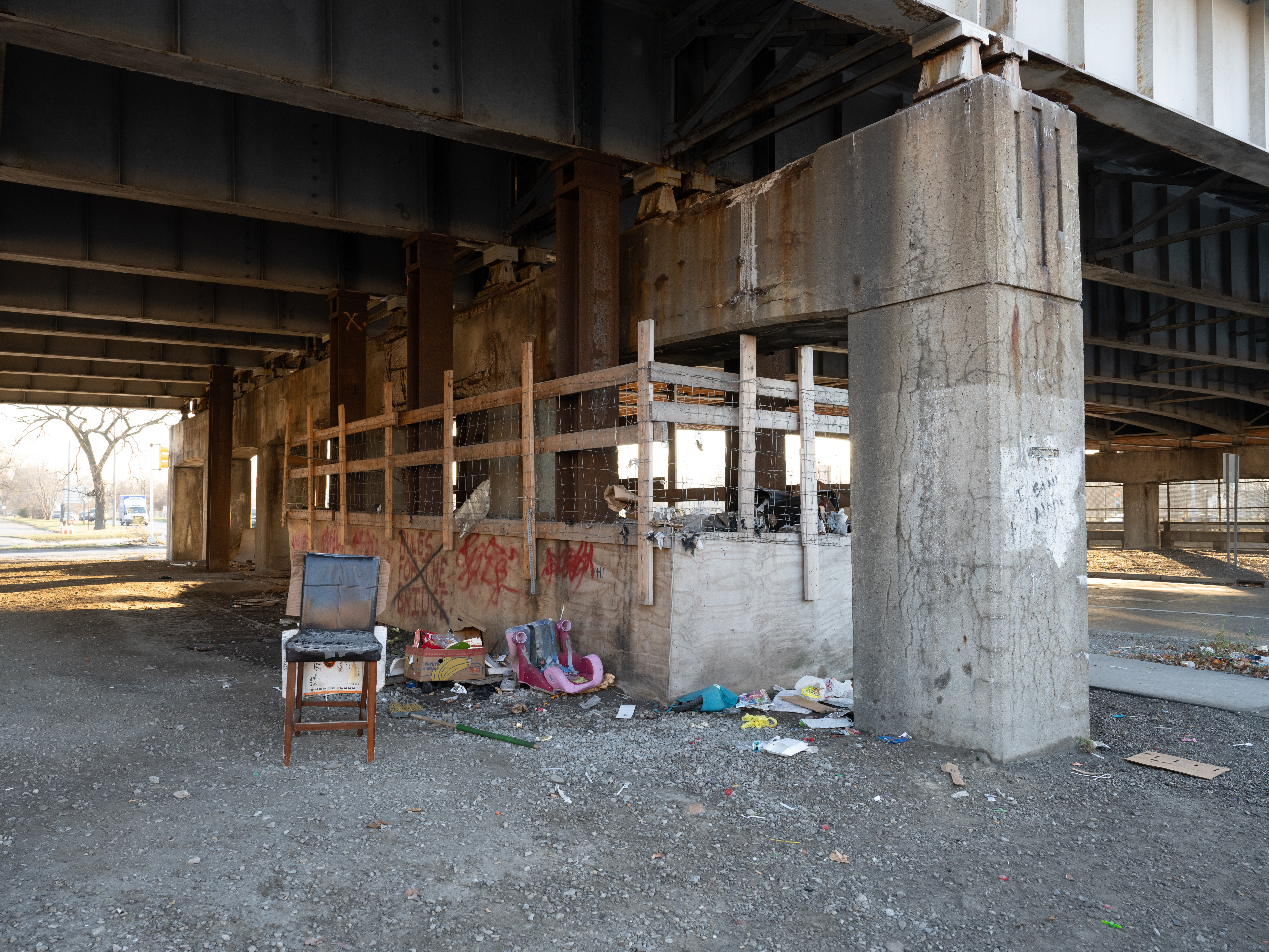

Well, you know, for me, I'm not even sure that I would have come to college if I hadn't made the realization that there's no job out there that will hire me for more than, like, 12 to $14 an hour without a college education. And even that doesn't guarantee it anymore, it doesn't seem like. So, I think maybe it would do people some good to be a little more relaxed. Like, everybody around me, not necessarily me, because I think… I don't know. There's really no job that I want to work, even. I picked photography because I thought that it wouldn't get me burnt out. But like, even that, there's, you know, just setting up lights is like, I don't want to have to do that. So yeah, yeah. -You got to find something that you love.- Well, I think what I would really like is just to know that all my basic needs are met, and I can go see my friends and have hobbies and not have to fix things. But there's so many things that need to be fixed that I feel like that's what I should make my career out of. And that's why I'm leaning more towards documentary photography work instead of something like, you know, getting into marketing or fashion or something. I guess that you can spread messages with fashion. But I don't know, it hasn't struck me yet. Sometimes people tell me that I work really hard and I'm like, I don't feel that way. My head is always clouded with like one thing or another. -It feels like you're a creative individual. There's always ideas going through there. It's better than being empty.- Yeah.


Trinity ~ As far as a job, I feel as if the 4-day workweek wouldn't affect my current relationship with work because I only work part-time hours. However, this 4-day work week may affect my parent's ability to financially support my schooling. Personally, I am not the most knowledgeable as far as the union and its relation to labor regulations. However, I do think it's necessary to have viable rulings that allow citizens to have an appropriate balance for both work and personal affairs. -The request from the UAW was 32 hours of work with the same rate of pay that they'd gotten with 40hrs, so in theory it shouldn't affect pay. So knowing that, how do you think it might affect your future?- Oh I think this will be so much better for balance. I feel, especially being in a creative field, work tends to consume both your work life and personal life. It’s hard to turn off creativity, but at least with the 32 hours of work it will allow for better balance and personal time. I think this would be extremely beneficial for productivity and better mental health.

Marty ~ I think it'd be good. Yeah, I think it'd be good because we're only working 32 hours and getting paid for 40? Yeah. So that'd like, give us a day off. Yeah. A whole day off without working. Without doing anything? Yeah. So that'd be good. It's beneficial. -What do you think you’d do with that time?- Go fishing.


Katelyn ~ I honestly am really excited by the idea. I think, you know, when you have, like, a three-day weekend, I feel like you always come back much more refreshed than, you know, working with five days. I just think that, you know, people need more time to themselves. I think we've kind of gotten into this sort of grind mindset where we always have to be working. Always have to be doing this. And I don't think that that's the case. And like I said, you know, my dad works for Chrysler right now. They work over 40 hours a week. He's on the line on Sundays. He works seven days a week. It's terrible. My dad’s like, 60, 65. Please just give them retirement buyouts. I would really love that if they would do that. And I just think, like, I don't think we exist to work. And so, I'm kind of excited, and excited by this idea.


Kapus ~ Man, I would love it. That’s an extra day off with the same pay. It gives me a day to spend with my family or clean up around the house, or just have a beer to myself. So, yes, I'm all for it. I hope that does happen. / Shawn ~ So, if I had less work but the same pay, that would help out a lot. I'd be able to do a lot. I know I'm gonna get a lot of work done around the house, but I don't know. I'm into RC cars, so I'll be doing a lot of racing, I guess get some racing time. So, the racing, doing a lot of work around the house, you know, stuff like that.

Chris ~ For me personally, I believe it would have a very large positive effect, because I would feel like I have more of a work-life balance. It would have positive repercussions for my mental health as well, because I'm not working 9 to 10 hours a day, five days a week, and I have high hopes for this if they do. Like, actually, when this began, the UAW initially set the precedent for the 40-hour work week in general. I like to bring that up to people whenever they mention it. But yeah, I think it overall it would be a very positive for my well-being as a whole. And I'm actually able to live life more instead of spending my twenties working.


Shatima ~ Honestly, for the auto workers, I feel like maybe a 32 hour a week schedule would be good. But, I mean, because they do hard work. You know, it’s strenuous on their bodies, so, 32 hours a week would be pretty workable, you know? But as far as it like, trickling down to other areas, other jobs, may not be that good, because if you only have 32 hours’ worth of work, then the regular 40 hours that people are expecting, they’re not going to get. -Yeah, I was wondering like- will we have to, I think, get more employees then?- Or hire more people, because what about the other 8 hours that people need, you know? Is it going to be the same 32 hours with 40 hours’ pay? Or is it going to be, you know- Would they work that out? If it was 32 hours a week with 40 hours’ pay, that could probably work. I mean, it depends on the job, really. But if it's like, a hard-working job, a strenuous job where, you know, you get 10 to 12 hours a day, why not? Why not give ‘em a break? Everybody needs a little time to sit down and relax. -Somebody was saying that, like, um, the whole culture would have to shift, like, you know, everybody would have to start working, like, say, Monday to Thursday.- Yeah, because you got to think about it. Hey, there's, “who's gotta come in Monday through Thursday?” Then you have, doctors Monday to Thursday. It’s like, it’s a lot that’s gonna have to change and switch up, you know? That could be difficult. You know, because, what about people who like to work Monday through Friday? You know, what about people who don't like working Monday through Friday, you know. What about people who want to work on weekends or… So, you got to, you know, accommodate for everybody.

James B ~ Well, I think it would be a good thing for me because it would give me an extra day to do things at home, around the house. And it would give me less days of getting up early in the morning to come out, which would save me a little gas, I'm sure. And I just think four days would be better than five. I worked for a company that talked about it years ago, and it never happened. And we even voted, and I was one that voted for it. Yeah, because I have always wanted a four-day week. Even if I had to do 10 hours a day, I would rather work for four days than five. -Well, see, this was the 32-hour workweek, so, it would have been even less.- Yeah, so that would have made it even better. -Well, I'm sorry they didn't go through with that after telling you they were going to.- Yeah, but, you know, I mean, we knew we had to vote on it, and I think the voting came in our favor. I think it was just, the higher-uppers just never went through with it. Because most of the people I talked to, we was all for it. Co-workers, you know, some of my supervisors. Everybody. Pretty much 90% of the people I talked to at the company wanted the four days. So, it never happened, but I remember it, you know, going through that. -What kinds of things do you think you’d do with that extra free time?- Do things around the house. Have another day with the family. Another day, you know, to be at home with family. And even if I choose to rest, another day of rest. And I'm sure there will be some days when I would take advantage of it and go out and do something. So, it would help me a whole, whole lot. A tremendous help for me.

Linda ~ I would have loved it because when I retired from Greektown and I came back to work for CCS, I came back working Friday, Saturday and Sundays, afternoon/midnights, and I loved it. It allowed me to take care of my mom. It allowed me to work for the lawyer that I live with because I have an agreement to keep his house kept up. And it also gave me time to take care of me. So, I worked three days. It was 48 hours, and I was off for four days. So, it worked it out perfect for me. So, if I was to be off now, work four days and get paid for five, it’ll really allow me… Because right now it seems like you really don't have much time to do much. You function better when you’re organized. So, when you allow a worker to work 32 hours, that gives them more time to be more organized and then they can work better, and they can do better. Yes, I'm for it. You know, I used to be a union president. That's what I was. Over the casinos. Yeah, and the country clubs and the sports arenas. The Local 24. That's what I was a part of. And so, I am for that.


James R ~ I think it would work well. It would actually be good for us. It would be more productive, more rested, and more willing to tolerate, you know, just about anything. Makes a better workplace, that’s for sure. Yeah, it would definitely make a better workplace. I understand that everyone couldn't do it because some of our jobs require five days, a full workweek. Like mail, it’s gotta go out. So, I think it would kind of affect me differently because of that. Because we need our mail every day. But other positions, I think it would work great. -Somebody was saying that maybe the entire culture would have to shift, like everything would have to run on the four-day. But I think mail runs six, seven days.- Yeah, it can. It's up to seven days now. So, that would be a hard thing to adjust to as far as mail. But everything else, I think it would work great. It makes for a better workplace. It does.

Jan ~ I wish they had gotten the four-day workweek, because so often what the UAW does eventually becomes part of the normal work life for everybody else. I mean, the UAW, to me, have always had one of the best benefit packages and then that a lot of the things that they got trickled down to everybody else. And I know there are people who pooh-pooh that because I know on Facebook, there were people making comments about, you know, oh, ‘this is going to make cars more expensive’ and it's going to do this and it's going to do that. I mean, they were totally anti-union. And I said, you know, a lot of the stuff you take for granted in your work life is directly due to unions and what unions have been able to get. And some people agreed with me, and some people don't. But it's true. And my dad used to say that all the time when people were bashing unions. We had a neighbor who was in management for Republic Steel, which was a big steel mill in Cleveland, and he used to always be going on and on and on about the Steelworkers union. And he didn't really like a lot of the things that they demanded, and my dad just said to him, “But when you get those same benefits after the union has won them, do you ever say no?” And that's it! I mean, people don't. If they get more vacation time, or they get a higher wage package, or they get better medical benefits, they never say no. So, I wish they had gotten the four-day workweek, because that would be really nice to have. I just hope the automakers don’t shift more jobs overseas. Because, you know, that’s what all these naysayers are claiming will happen. I guess time will tell.


John ~ A four-day work week would have a massive impact on my life. I'm a new father - my baby girl was born on August 5th - so an extra day a week at home with her would be just about the best thing I could think of. It would mean more time to be with her and my wife, more time to spend working on my little house, more time to visit my parents who live in Ohio, and more time to potentially have a life outside of my job. I do love my job but there is a tendency around here to work well beyond the 40 hours of the work week and get burned out. A 32-hour, 4-day week would be a godsend.

Katie ~ Well, I'm an educator, so I think I believe in just revolutionizing our approach to any way that we do life. And, you know, if you think about it realistically, the 40-hour workweek came out of a labor movement previously, when they had to work until their backs broke. And so that was, what, 70 years ago? Now we're in a very different era. And so, we constantly need to be reevaluating how we approach work and how we approach life. So, I don't think that the call for 32-hour workweek with 40 hours of pay is necessarily about… I think a lot of folks think about it as like, oh, they don't want to work as much. Obviously, none of us want to work as much. And more and more research comes out saying that working more is not good for you. And so, as an educator, I would love to exist in a space where I am able to educate students on how to care for themselves, how to have balance, how to make work, work for you instead of you working for work. And so, I mean, selfishly, I think pay equity is a huge issue in education, but, you know, across America, I think internationally even. And so, if we can accomplish a major deal like 32 hours for the UAW, they're the ones who set the pace for the labor movement in the first place. So, if we can revolutionize that one, I think students are going to be graduating from our institutions with a better sense of balance and how to be a real person instead of everything being about work. But then I think selfishly about my own work life balance and how I have explored more and more, over the last few years, my desire to not live my life for a career, not live my life for work all the time, but still needing to survive and still needing to have a good quality of life. So, I think that there's a mindset shift that has to happen way outside of autoworkers, right? It's not even- I don't think that the call for this is even about the fact that they're the auto workers union. It's about how our society's expectations of us have shifted and what our expectations are of one another. And so, if we can revolutionize the work week, I just imagine we can revolutionize all sorts of things about our society. People who are more well-rested, who have more time with their loved ones, who have more time to lean into things that they actually care about and love instead of everything being about work, just have a better quality of life, are going to live longer, are going to be more willing to give back to their communities. They're going to be spending money in their communities. They're going to be growing families. So, I would love to just see my community well-rested, cared for, eating, having a roof over their heads, basic human rights and what we consider to be basic human rights now, obviously is different than what it used to be. So, we need to get up to pace with that.

Avery ~ Right now, the standard 5-day work week is designed to claim more than just the paid 40 hours. This structure, which ultimately hasn't changed since 1926, aims to maintain its existing ownership of our personhood. As technology has developed, so has the expectation of work after hours and availability for emotional and/or physical labor at the drop of a call or email. Social spaces around me are constantly consumed for the development of commercial property, and my social life has been forced to exclusively exist with my coworkers, as I have little to no personal time outside of physical recovery to engage with other people in my community, who are not associated with my job. Our social and internal lives have been engineered to revolve around work 24/7 – I am one semester away from graduating with my BFA and the prospect of celebrating this accomplishment by immediately submitting myself to the meat grinder is dreadful. For me, a 4-day work week is beyond wanting an extra day to my weekend. It is about reclaiming my life in so many different ways, even though I enjoy what I do. A 4-day work week would allow me to not only recuperate and return more effectively, but to ultimately grow in ways I don't think will be possible for me looking forward at the current standard.


Amy ~ You know, it's an interesting proposition, a 32-hour work week. I would love a 32-hour work week because I realistically probably have an 80-hour workweek with what I do here. You know, it's about… it would take a paradigm shift, right? Because we have- culturally, we hold certain values around what it means to work full-time, or the value of a worker. You know, ‘if you're not putting in all the hours, are you really doing the work you can do?’ But then, you know, you hear about things in Europe, or where people are very efficient, because there's a value on a work-life balance. And I think that notion of a 32-hour workweek is doable in all contexts because you can stagger who's working when. I mean, it doesn't have to be “everybody is working Monday through Thursday and everything's closed Friday through Sunday.” You know, businesses or organizations or educational institutions could think very creatively about how to make something like that work, to achieve a work-life balance for everybody involved, including students. Right? Yeah, you know, that's really important too. The same kind of values need to, you know, matriculate to all the population, not just certain people. But it takes that paradigm shift internally, you know, and a value shift culturally in how we think about and value what we do and produce in our world. You know, in the summers when we don't have as many students on campus, sometimes we'll take Fridays off or work remotely, which sometimes helps too, because it can break up the way you're working, because space impacts how you're relating to ideas and content. But for me, because of how hard this particular position is, and the demands on it, having that extra day, it makes a radical difference in how I feel. Because a typical weekend, like, I'm just finally winding down by like mid Sunday, and then I'm like, “Huh, Now I got to ramp right back up the next Monday.” So, when I had that Friday, you know, Friday was suddenly a day I could run errands and do things that I needed to do. Laundry, whatever those things are, which are work related, but work-life as opposed to work-work. And then I would have my Saturday and Sunday to visit people. -And actually get all the best out of life.- Exactly. So, yeah, there's a lot to be said. You know, there's other ways of thinking about it too. Some people do, you know, 6 hours, five days a week, and then you have more time during the day. That would be nice to have that choice.

Don ~ My background's anthropology, and I studied what's called deindustrialization - factories closing. The current strikes were historic because of the opportunity for Labor to get more resources or more compensation. And that's important. The companies are making a lot of money. I studied a Motor Wheel plant, and they made steel wheels. I interviewed almost 100 workers of all different kinds at home, at the bar, at the union hall. I can only tell you about the generalities because I’m removed from studying that now. And you know, I haven't really followed up on General Motors, Stellantis, or Ford because I got so much other stuff to do. But, you know, that technology is replacing a lot of people and that the 1% is real. And that I think, there's an opportunity to use technology to improve society. The workweek thing – that may come because, again, technology is sort of pushing us through our sort of traditional economy where technology can do more and more jobs. And so, there's an opportunity for people to not have to work 40, 50, 60 hours a week. As we get smarter about the environment and about, you know, how we use technology for the greater good and not just for profit, we can do better for you, for all humans. We, as a society, are going to have some choice points about how we organize economics. Money is really just an idea. And you have to have a belief in it. But technology's going to disrupt that too, you know, the idea of everybody having to make a certain amount of money or even having to work a certain amount of hours. It's just how we move forward, so the most people benefit, and not just a handful.

Ravyn ~ I think that would benefit my life a lot. Like I would have more of a work-life balance if I didn't spend five days out of a seven-day week at work. You know, and even though people say, “well work is only 8 hours, that's only a third of the day,” you’re not awake 24 hours, you know? You sleep 8 hours and then you have 4 hours around that time. And, to genuinely… if you're a creative or you're trying to get into some type of mindset, it takes consecutive days, if not weeks, to actually feel some type of creative impulse or feel safe enough in your space to do whatever you want. You know, like, work affects people in and outside of work. Like, those 8 hours, you know, that still affects people outside of work. They have to do some type of recovery outside of work, even though they're not there for 8 hours. When they go home, they're sitting down for a couple of hours. And that’s less time that they could take to do whatever they wanted to do. So that would definitely benefit, if we could have four days of work, three days, that would be more of a balance, quite literally. It's not a balance if you work a majority of the week and only have two days off, I think that's just a gimmick. You know what’s so crazy is that, about the Industrial Revolution- the whole thing was to make labor less intensive for humans, right? So, you get a lot of older generations, who did have to work hard before those machines could do the work, saying like, “Oh, well, this generation doesn't want to work anymore.” We realize we don't have to work that hard for that little. There are machines to do this job. No one has to do this hard work anymore. No one has to do this. It’s ridiculous. It’s not necessary. And there's too much money not in circulation. Like, there's no reason for anybody to work this hard, which is why nobody wants to work this hard. Because we literally have made machines. Y’all crawled so we can walk. So why can't we walk? Y’all are mad that you had to crawl so we can walk? You made the machines. Let it take the job so we can do what we want to do. That's the point. That’s the point. Automated, so we don't have to labor. We can make new things, grow our society, grow our health, grow the world. And you don't have to worry about agriculture. You got machines to do it. You don't have to worry about clothes. You got machines to do it, you know? Art is still an art, but in terms of necessity, we made these machines for a purpose. So let them do the job, and let people do what they want to do. You know, they’re like, “they don't want to work anymore.” We know we do not have to work like this anymore. We know we do not have to be this depressed. They make A.I…. They make all these machines to do what we don't feel like doing. So, what do you do? I support a communist or socialist society for real. This shit is ridiculous. Like, let people just do what they want to do. Let them do what they want to do. I had that thought the other day. I was like, all these machines you got going around, you got people afraid that they're going to lose their jobs. And it's just like, okay, so what jobs can you offer? I mean, because not everybody is going to college and not everybody can do like some type of monotonous, specialized skill. So, at some point the money is just going to have to give. Like if you're going to take away these jobs, then you’re taking away places for people to work. I mean, either you can make some more, but is that actually going to fit the population, or just let people live the way that they want to live? Like, I don't… I don't get it. But I'm not rich. Like, I'm not… I don't have that money-hoarding mindset.




































